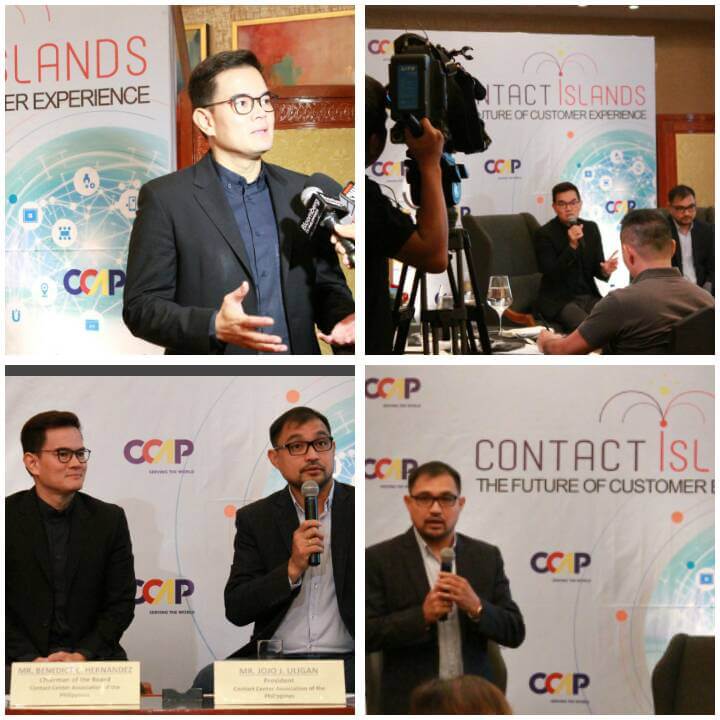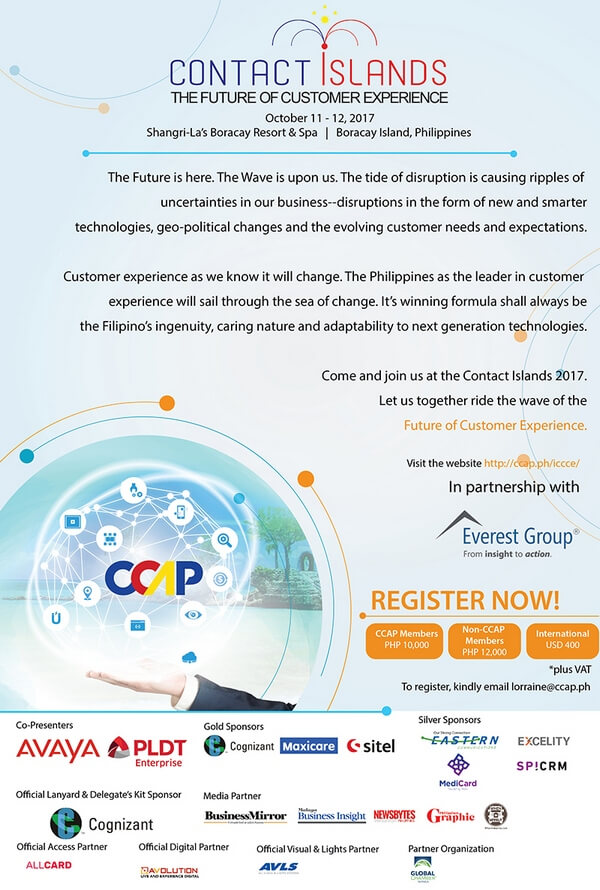The annual industry conference of the Contact Center Association of the Philippines (CCAP) called “Contact Islands” will tackle vital industry trends such as the impact of Artificial Intelligence, Robotics, Analytics, and other key technologies, on the industry and job creation.
“You can view the emergence of digital technologies as either a threat, particularly on job creation or an opportunity. Our industry certainly sees the upside opportunities in investing in digital technologies to drive enhanced experiences of our clients and customers. In fact, digital capabilities in analytics, robotics, artificial intelligence have opened new opportunities for us to impact customer experience or CX” says CCAP Chairman Benedict Hernandez. “Our clients have started to look to us to help them reimagine and enable their customer experience (CX) strategy in the age of digital. These are exciting times for our industry,” he continues.
This digital age is part of a continuing evolution of the industry, starting from the centralization era in the 80’s, to the offshoring movement in the 90’s, the industrialization focus on standardization, quality and efficiency in the early 2000s. Today, the game has changed and this presents this unique opportunity to be the ‘go to’ partner and enabler of our clients in transforming CX in the age of digital.
Our companies have always been an early adopter and innovator in the use of technology. When you combine that with our two decades of expertise in our clients’ businesses, the Filipino’s unique service culture, and our young, adaptive workforce, you have a unique combination that best positions us as a global enabler for CX transformation.
But what about the impact of technology on job creation or destruction? On the part of the existing talent pool, Jojo Uligan, President of the CCAP, emphasized the need for them to gain new competencies such as technology proficiency, deep industry or domain expertise, problem-solving and analytical skills. “The nature of work will continue to change, the same way it has changed over generations,” he says. “Rules-based, transactional type of work will be the first to be automated, this is already happening today,” he adds. Being technology-enabled, developing expertise, and honing one’s analytical skills are needed as our people take on more complex, judgment-based and quite frankly, more interesting work. “I don’t think we should focus the debate on whether jobs will be lost with the emergence of these technologies. Jobs are being transformed and our focus now is the investment needed in upskilling our people,” explains Uligan.
Uligan also revealed that the industry will continue to work closely with government in order to facilitate upskilling and new learning for the talent pool in order for them to adapt to these new technologies.
Indeed, CCAP is forecasting that their sector will add over 73,000 jobs per year and by 2022 will grow to almost 1.2 million in employment from 751,000 in 2016. “We predict about 8% annual growth until 2022, that takes our revenues from $12.8 billion (USD) last year to $20.4 billion in 2022,” Uligan shared.
With the theme, “The Future of Customer Experience”, Contact Islands is a collaboration between CCAP and Dallas, Texas-based Everest Group, a leading global consulting and research firm. The Everest Group will be presenting their white paper entitled, “Philippines at the Helm of Delivering Customer Experience of the Future” during Contact Islands.
Contact Islands will also be the perfect gathering of industry thought leaders that will discuss other relevant issues. CCAP will gather some 300 leaders in the industry, allied business and government to discuss other critical issues confronting the industry today. Among these include the role of the Philippines in delivering customer experience and how new technologies are revolutionizing customer experience and impact on jobs.
“The Philippines continues to be a leader in delivering outstanding customer experience to its customers around the globe. Undoubtedly, Philippine talent enjoys the reputation of being the top pick of global outsourcing companies, and we are determined to keep that reputation using the positive implications of these new technologies in delivering our most sought-after brand of providing nothing but the best customer experience,” Hernandez emphasized.
The Philippine IT-BPM industry has grown significantly in the last several years not just in terms of employees but also in revenue. The Bangko Sentral ng Pilipinas (BSP) predicts that by 2017, the IT-BPM (Information Technology and Business Process Management) industry will be the Philippines’ largest source of income. From 525,000 employees in 2010 and $8.9 billion in revenue to an expected 1.3 million jobs and over $25 billion in revenue for 2016, it is, to date, the most lucrative and fastest-growing industry in the Philippines.
For registration and sponsorship inquiries, please call the CCAP Secretariat Office at +63 (02) 843-0603 or send an e-mail at events@ccap.ph.






